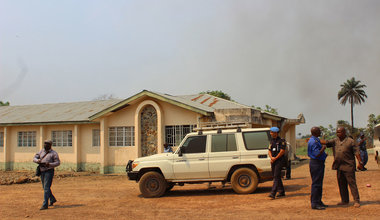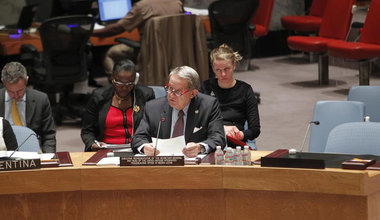Evaluation of the Recently Enacted Local Court Act 2011
In July 2011, Sierra Leone's Parliament passed into law The Local Court Act which repealed the 1963 legislation. This is a significant development in the legal annals of Sierra Leone as it transfers oversight function over the Local Courts from the Ministry of Local Government to the office of the Chief Justice.
Sierra Leone has a two tier justice dispensation regime; on the one hand is the formal justice sector and on the other the informal justice sector. Both systems have been given legitimacy by the constitution and other statutory instruments. The formal legal system consists of the common law, statutes and the Constitution. The informal legal systems consist principally of Local Courts that apply customary law in rural localities. Local courts are established in all districts within the country with the exception of the capital city, Freetown. The sole aim of establishing these courts is to meet the particular needs of people residing in rural areas by dispensing justice within the specific context of the customs of their localities. It is estimated that the vast majority of Sierra Leoneans residing in rural areas access local courts to seek legal redress.
Local Courts have existed since pre colonial times. Taking into account the important practical role they play, Parliament passed into law the Local Court Act 1963 with the intention of granting them statutory recognition and defining their modus operandi. Over time, the operations of some Local Courts in the country have come under the scrutiny of human rights defenders who have raised concerns over the lack of human rights compatibility of certain judgments that fall short of recognizing women's' rights to inherit property and gender equality. Moreover, the country's Truth and Reconciliation Commission in 2004 made series of recommendation which include the transfer of supervisory function over the Local Courts from the Ministry of Local Government to that of the Judicial and Legal Service Commission.
In the past, the Minister of Local Government was statutorily mandated to appoint and dismiss local court officials as well as supervise them. However, it was argued that he, being a politician, faced the temptation of appointing officials on the basis of their allegiance to the ruling party. This perception had dented the public image of Local Courts as lacking integrity, independence and impartiality. Within the new law, provision is made for the Chief Justice after consultation with the Judicial and Legal Service Commission to act in tandem with The Local Court Service Committee to appoint, transfer, promote, and suspend any Local Court official. Those who have abused his power may even be dismissed.
The recent establishment of Local Court Service Committee in each province is another positive development as the Commission consists of individuals who have a stake in the wellbeing of the community. These include: a Paramount chief representing the council of chiefs in that province, a representative of the District Council who should be a person with experience in the administration of Local Courts, etc. Their involvement would give added credibility to the recruitment process of local court officials contrary to initial views by community members that it was merely a means of creating employment opportunities for ruling party supporters.
Worth mentioning also is the fact that the new legislation stipulates criteria for the appointment of Local Court Chairpersons: such persons shall be proficient in the dominant ethnic language of the chiefdom, they must be literate in the English language, must have resided in the chiefdom for a continuous period of not less than five years and should have in-depth knowledge of the customs and traditions of the locality. On the contrary, the repealed legislation did not impose qualifications; the appointment of a Local Court official was left solely to the discretion of the Minister of Local Government.
Furthermore, the 2011 Act tackles one of the foremost challenges confronting Local Courts nation-wide, which is the imposition of often exorbitant and arbitrary fines on litigants. The Act directs that the said courts shall have the jurisdiction to levy fines not exceeding fifty thousand Leones ($ 13) and that any Local Court official who levies a fine or a fee which contravenes the Act will be liable to a fine of two hundred thousand Leones or to a term of imprisonment not exceeding one year, or to both imprisonment and fine.
Additionally, the new enactment provides for all fees, fines and other monies collected by the court to be deposited in the government-consolidated fund, consequently; it prohibits Local Court officials from pocketing such monies. It is hoped that this will reduce the urge by some Local Court officials to impose excessive fines to prop up their minimal wage they are receiving. In short, it will reduce corruption in Local Courts.
The unauthorized establishments of parallel courts in the country, allegedly being operated by paramount chiefs and their officials, have threatened to undermine the lawful existence of Local Courts in some rural communities. The Act imposes penalties on prospective defaulters who must either pay a fine of two hundred thousand Leones or face a term of one year imprisonment, or both.
End
 UN
UN



